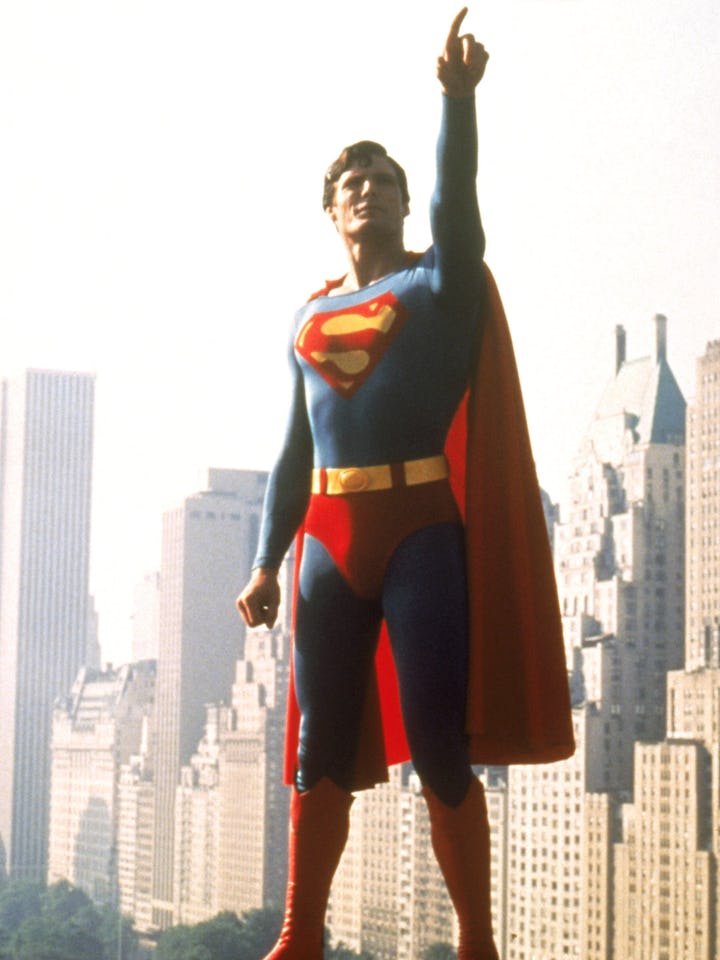How Christopher Reeve Rediscovered His Love of Superman
The directors of the new documentary Super/Man talk about the amazing real-life journey of a superhero icon.

“I did all my own flying.”
In an interview with Starlog magazine ahead of the release of Superman: The Movie, you get the sense that Christopher Reeve had truly come to embody Superman. You’ll believe a man can fly, the movie’s tagline proclaimed. But for Reeve, it wasn’t just a claim. It was true, and it had nothing to do with stunts or special effects.
“The flying happens in the eyes,” Reeve said in the interview, published in March of 1968. “The flying comes in the conviction that you know where you are, what the altitude is, what speed you’re going and you know what you’re looking at.” For this reason, Reeve claimed he was “never doubled” by a stand-in.
A billboard for Superman: The Movie from 1978.
Reeve’s love for the character is palpable in both this magazine interview and the movie itself, but the actor somewhat infamously fell out of love with Superman in the years that followed. At a certain point, he felt so trapped and typecast by his reputation as the Man of Steel, that he considered not returning for Superman III. For his final appearance as Supe in 1987’s Superman IV: The Quest for Peace, Reeve only accepted the role because he was allowed to help shape the story.
Much has been said in the decades since about Reeve’s portrayal of Superman and how it changed both superheroes and Hollywood forever. Now, a new documentary titled Super/Man: The Christopher Reeve Story finds a way to tell a new version of a familiar tale. What co-directors Peter Ettedgui and Ian Bonhôte learned in telling the story of Reeve’s life is that it took a near-fatal accident to make the beloved icon fall in love with the idea of Superman again.
“Before the accident, he's somehow trapped by this part and he's trying to run away from it,” Ettedgui tells Inverse. “And then, after the accident, the realization that he can use his fame and his reputation as Superman — which he'd always run away from — to change the world. That was the key thing for us.”
Peter Ettedgui and Ian Bonhôte, directors of Super/Man.
As the first film released under James Gunn’s new “DC Studios,” Super/Man introduces the DCU era not with impressive special effects or universe-building lore, but instead, by looking back at what is, arguably, the foundation of all modern superhero cinema. When Christopher Reeve starred in Richard Donner’s 1978 film Superman: The Movie, an entire genre was born. This was a comic-book movie that was also, quite simply, a good and somewhat serious film. Today, we talk a lot about superhero films crossing over into the mainstream or possessing artistic sensibilities that surpass their genre, but Superman did it first, and it’s impossible to imagine that happening without Reeve.
“The film ended up being about love, family, and legacy.”
Somewhat surprisingly, Super/Man is not a documentary about the making of Reeve’s four Superman films (spanning 1978 to 1987). Instead, it’s a movie that tells his origin story as an actor who becomes Superman and then suffers a tragic accident, which transforms him into a different kind of hero.
“The film is much more than just putting him on a pedestal and celebrating Superman,” Bonhôte says. “We love that people miss him and still think he embodied Superman, but the film ended up being about love, family, and legacy.”
Christopher Reeve, after his 1995 accident.
In 1995, well after his career as the big-screen Superman, Christopher Reeve was paralyzed from the neck down following an accident in which he was thrown from a horse. This incident led to Reeve becoming a public advocate for more medical research, including stem-cell research to help people in his position gain mobility. In Super/Man in a previously unreleased interview with Richard Donner, the famed director says that Reeve made him believe he could fly, “and now I believe that he'll walk again.”
Christopher Reeve never walked again, though he regained a significant amount of movement in his body before his passing on October 10, 2004. But the story of Super/Man isn’t focused on outcomes, but rather, the way in which Reeve lived his life, both before and after his accident. As the movie reveals, Reeve rediscovered his love of Superman because of his accident, and that fictional heroism was transformed into real progress.
“There's something quite Shakespearean about it.”
Bonhôte and Ettedgui explain that because they both “come from a fiction filmmaking background,” it was important to structure Super/Man in a way that captured the spirit and heroism of Christopher Reeve throughout his life, and not just as a comeback story.
The result is a beautiful and moving documentary that not only reveals the depths of Reeve’s pain but also his triumphs and impact on people from all walks of life. In this way, Bonhôte and Ettedgui aimed to make a movie not just about Christopher Reeve and Superman, but something that was, in a sense, about everyone.
“You start with a version of what he thinks about heroes in America,” Bonhôte says. “And then it's about an American hero by himself understanding what it is to be a hero and how you can do it. Generally, it's about small acts of kindness, small acts of moving the needle in society. And then, you suddenly become a hero yourself.”
“There's something quite Shakespearean about it,” Ettedgui adds. “Shakespeare would take a story that everyone knew — like Hamlet — but use that story to say something about the human condition. For us, Christopher is a modern equivalent. He’s this massive epic cinematic hero on one level. But we can take that and tell a story about a real superhero that reflects on the human condition.”